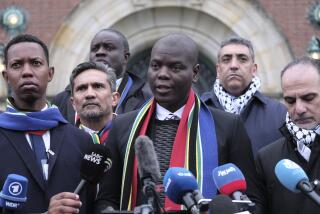Rights Tribunal Falters Amid Legal Wrongs
- Share via
The U.N. tribunal for Rwanda has toppled from its human rights pedestal, and its fall is entirely of its own making. On Nov. 3, an appeals court ordered the release of genocide suspect Jean-Bosco Barayagwiza on the grounds that his “fundamental rights were repeatedly violated.” The former government official had spent 11 months in a Cameroon jail without being charged, but the tribunal never got around to hearing a writ of habeas corpus demanding his release. His first court appearance came 96 days after his transfer to the tribunal, a clear breach of his right to be seen “without delay.” The appeal chamber ruled that the prosecutor’s handling of the case was “tantamount to negligence” and that his trial would thus be a “travesty of justice.”
The International Criminal Tribunal for Rwanda was established by the U.N. Security Council in November 1994. Its mandate was to prosecute the perpetrators of genocide and heal the wounds of a ravaged nation. It was to be a paragon of international justice, and its impartiality and commitment to humanitarian values was favorably contrasted to the harsh justice being meted out by local authorities.
From the outset, the tribunal was determined to fry the biggest fish. In 1996, the Rwandan government requested the extradition from Cameroon of Barayagwiza and other senior Rwandan officials. The tribunal then stepped in and claimed them for itself. It now holds several dozen prime suspects in Arusha, Tanzania, while Rwanda has been left to deal with 120,000 of their supporters, which, not surprisingly, has antagonized the government in Kigali. As Prosecutor General Gerald Gahima said, “It makes it harder to forgive the ordinary people if we don’t have the leaders here to be tried.”
Critics also focus on the tribunal’s breaches of legal rights. Jean Kambanda, the former Rwandan prime minister who subsequently confessed to charges of genocide, was held in a secret “safe house” for nine months and thus was denied proper safeguards against compulsion to confess. Esdras Twagirimana, arrested because of mistaken identity, was unlawfully held for two months without access to a lawyer. Alfred Musema, a tea factory director, first appeared before a court--without a defense counsel--184 days after he arrived in Arusha.
Earlier this month, the tribunal sentenced Interhamwe militia leader Georges Rutaganda to life imprisonment for genocide, extermination and murder. The verdict followed the Barayagwiza case and was welcomed as a corrective to that fiasco. Yet there were problems with the Rutaganda case, too. In February 1997, his Canadian lawyer, Tiphaine Dickson, filed an “extremely urgent” request for statements from 16 defense witnesses living in the Tingi-Tingi refugee camp in Zaire (now Congo). While the court sat on this request for three weeks, Zairean forces under Laurent Kabila attacked Tingi-Tingi. All the witnesses fled, 14 of them never to reappear. Dickson argues that the delay violated Rutaganda’s right to a fair trial because it had prevented him from establishing alibis. Some also contend that Rutaganda was scapegoated to satisfy the court’s desire for a major conviction to restore its credibility after Barayagwiza. “There was going to be considerable pressure to convict the next guy, and my client just happens to be him,” Dickson said.
Maybe the problem lies in the nature of the court itself. How can a crusading tribunal, serving political ends, deliver impartial justice? The court’s founding document identifies two aims: to bring to justice those chiefly responsible for the 1994 Rwanda blood bath and to contribute to “national reconciliation” and the “restoration and maintenance of peace.” Some see this mix of legal and political objectives as a recipe for show trials. Last year, French lawyer Andre Ferran warned tribunal judges: “You are being asked to contribute to reconciliation and peace--in other words, not to deliver the fair verdicts that your human consciences would dictate. You are told: Bear in mind not the sacred truth, but a form of truth forged in the furnace of political utility.” The desire to condemn genocidaires already appears to have usurped the principle of innocent until proved guilty.
And what of Barayagwiza? Invariably in such cases, the accused is released. But not this time. Barayagwiza remains in prison while his case is “reviewed” amid frantic horse-trading. This month, U.N. war crimes prosecutor Carla del Ponte and Washington’s U.N. envoy, Richard Holbrooke, visited Kigali. The Rwandan authorities are keen to try Barayagwiza themselves and, to accomplish that, are rumored to have offered to suspend the death penalty. With the tribunal looking distinctly tarnished, there’s a chance they might get their man after all.
More to Read
Sign up for Essential California
The most important California stories and recommendations in your inbox every morning.
You may occasionally receive promotional content from the Los Angeles Times.













